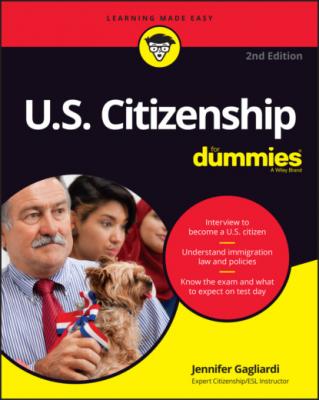ТОП просматриваемых книг сайта:
U.S. Citizenship For Dummies. Jennifer Gagliardi
Читать онлайн.Название U.S. Citizenship For Dummies
Год выпуска 0
isbn 9781119766896
Автор произведения Jennifer Gagliardi
Издательство John Wiley & Sons Limited
Even if you have a Permanent Resident Card, you’ll have to be fingerprinted and photographed when applying to become a naturalized citizen. After you’ve filed an application with the USCIS, you will receive a fingerprinting appointment letter, usually advising you to go to a local application support center or police station. The USCIS will do a criminal background check, cross-referencing your fingerprints with the Federal Bureau of Investigation (FBI). In some cases, the quality of the fingerprints is not sufficient for the FBI to read. If this happens, the USCIS will notify you of another fingerprinting appointment. Don’t worry — you’ll only have to pay a fingerprinting fee ($85 as of this writing) once.
Being Interviewed by the USCIS
Presuming you plan on following the immigration path all the way to the final step of naturalization, you can plan on interviewing with the USCIS at least twice: once to qualify for your permanent resident status or green card, and again when you become a naturalized U.S. citizen (unless your visa processing took place at an overseas consulate, in which case you’ll only interview with USCIS once — for naturalization).
The interviews fill many potential immigrants and citizens with terror. “How will I ever remember everything?” they worry. Relax. Passing the USCIS interview is easier (you are The Expert of your own life) and more difficult (uncommon vocabulary related to violent activities and war crimes) than you think. For some people, the biggest challenge is learning how to speak a new, crazy language, English. Don’t worry; study! In fact, you probably already have most, if not all, of the skills and information you need. And if you don’t, this book has you covered.
Interviewing for a green card
You need to live in the United States as a lawful permanent resident for at least three to five years before you can qualify for naturalization. Look at obtaining your green card as taking the first step toward citizenship.
For example, assume you’re a qualified applicant for permanent residence and you have a qualified sponsor — usually your employer or a spouse or other family member. You can prove these facts and have sent the USCIS all the necessary applications and documents covered in Chapter 4. You’ve prepared your case and have kept careful records of all the paperwork you’ve ever sent to the USCIS. Because immigration laws can be complicated, you’ve probably consulted an attorney or received other professional help in preparing your case up to this point. It’s been a long road, but you’ve done the work and now you’re ready to take the final step toward lawful permanent residence — interviewing with the USCIS (if you’re adjusting your status while in the United States) or interviewing with a consular officer (if you’re applying at an overseas consulate).
The USCIS officer will also review your medical examinations. The officer will ask if there is anything you want to correct about the background and biographical information you provided the USCIS. If anything has changed or you feel your documents contain inaccurate information, now is the time to speak up.
If your case is based on employment, the officer may also review your Department of Labor paperwork. They may ask questions about your job to determine whether you really worked in the occupation you claim when you lived in your native country. The officer may also want to know whether you have the necessary skills to perform the job in the United States.
Be prepared to answer questions designed to determine whether you’ve been working illegally while waiting for your green-card application to be approved.
If your case is based upon your marriage to a U.S. citizen, the interviewing officer will ask questions about your marriage and life together. The USCIS wants to feel confident that yours is a true marriage and not a union of convenience designed to get you into the country. The USCIS will require your spouse to come to the interview, and they can choose to interview you separately or as a couple.
In some cases, the officer will need additional information and paperwork in order to make a decision. If this happens in your case, the USCIS officer will reschedule you to return with the requested items another day.
If all goes well and the officer doesn’t need any more documentation, they will issue you an approval and you’ll be asked to return to the USCIS to get your passport stamped — as a lawful permanent resident. If you’ve been married to your U.S.-citizen spouse for less than two years, your passport will be stamped as a conditional permanent resident — conditioned on your still being married after two years. At that time, you may have the condition removed to become a full lawful permanent resident, which may require another interview with the USCIS. In either case, you won’t actually receive the green card itself for several months, although your new immigration status takes effect with the stamping of your passport.
Obtaining U.S. citizenship
Assume you’ve been a lawful permanent resident of the United States for at least five years

